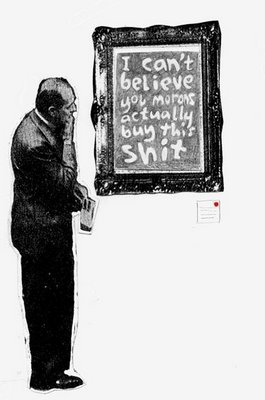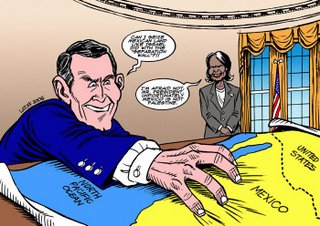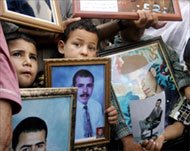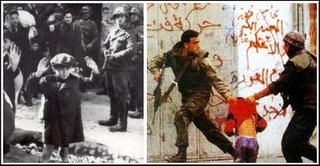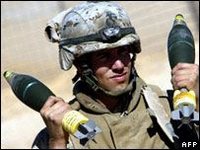cartoon by Khalil Bendib by David Phinney, Special to CorpWatchOctober 17th, 2006John Owen didn’t realize how different his job would be from his last 27 years in construction until he signed on with First Kuwaiti Trading & Contracting in November 2005. Working as general foreman, he would be overseeing an army of workers building the largest, most expensive and heavily fortified US embassy in the world. Scheduled to open in 2007, the sprawling complex near the Tigris River will equal Vatican City in size.Then seven months into the job, he quit. Not one of the five different US embassy sites he had worked on around the world compared to the mess he describes. Armenia, Bulgaria, Angola, Cameroon and Cambodia all had their share of dictators, violence and economic disruption, but the companies building the embassies were always fair and professional, he says. The Kuwait-based company building the $592-million Baghdad project is the exception. Brutal and inhumane, he says “I’ve never seen a project more fucked up. Every US labor law was broken.” In the resignation letter last June, Owen told First Kuwaiti and US State Department officials that his managers beat their construction workers, demonstrated little regard for worker safety, and routinely breached security. And it was all happening smack in the middle of the US-controlled Green Zone -- right under the nose of the State Department that had quietly awarded the controversial embassy contract in July 2005.He also complained of poor sanitation, squalid living conditions and medical malpractice in the labor camps where several thousand low-paid migrant workers lived. Those workers, recruited on the global labor market from the Philippines, India, Pakistan and other poor south Asian countries, earned as little as $10 to $30 a day. As with many US-funded contractors, First Kuwaiti prefers importing labor because it views Iraqi workers as a security headache not worth the trouble.No Questions AskedBy March 2005, First Kuwaiti’s operation began looking even sketchier to Owen as he boarded a nondescript white jet on his way back to Baghdad following some R&R in Kuwait city. He remembers being surrounded by about 50 First Kuwaiti laborers freshly hired from the Philippines and India. Everyone was holding boarding passes to Dubai – not to Baghdad."I thought there was some sort of mix up and I was getting on the wrong plane,” says the 48-year-old Floridian who once worked as a fisherman with his father before moving into the construction business.He buttonholed a First Kuwaiti manager standing near by and asked what was going on. The manager waved his hand, looked around the terminal and whispered to keep quiet. “‘If anyone hears we are going to Baghdad, they won’t let us on the plane,’” Owen recalls the manager saying.The secrecy struck Owen as a little odd, but he grabbed his luggage and moved on. Everyone filed out to the private jet and flew directly to Baghdad. “I figured that they had visas for Kuwait and not Iraq,” Owen offers.The deception had the appearance of smuggling workers into Iraq, but Owen didn’t know at the time that the Philippines, India, and other countries had banned or restricted their citizens from working in Iraq because of safety concerns and fading support for the war. After 2004, many passports were stamped “Not valid for Iraq.”Nor did Owen know that both the US State Department and the Pentagon were quietly investigating contractors such as First Kuwaiti for labor trafficking and worker abuse. In fact, the international news media had accused First Kuwaiti repeatedly of coercing workers to take jobs in battle-torn Iraq once they had been lured with safer offers to Kuwait. The company has billed several billion dollars on US contracts since the war began in March 2003 and now has an estimated 7,500 laborers in the theater of war.
by David Phinney, Special to CorpWatchOctober 17th, 2006John Owen didn’t realize how different his job would be from his last 27 years in construction until he signed on with First Kuwaiti Trading & Contracting in November 2005. Working as general foreman, he would be overseeing an army of workers building the largest, most expensive and heavily fortified US embassy in the world. Scheduled to open in 2007, the sprawling complex near the Tigris River will equal Vatican City in size.Then seven months into the job, he quit. Not one of the five different US embassy sites he had worked on around the world compared to the mess he describes. Armenia, Bulgaria, Angola, Cameroon and Cambodia all had their share of dictators, violence and economic disruption, but the companies building the embassies were always fair and professional, he says. The Kuwait-based company building the $592-million Baghdad project is the exception. Brutal and inhumane, he says “I’ve never seen a project more fucked up. Every US labor law was broken.” In the resignation letter last June, Owen told First Kuwaiti and US State Department officials that his managers beat their construction workers, demonstrated little regard for worker safety, and routinely breached security. And it was all happening smack in the middle of the US-controlled Green Zone -- right under the nose of the State Department that had quietly awarded the controversial embassy contract in July 2005.He also complained of poor sanitation, squalid living conditions and medical malpractice in the labor camps where several thousand low-paid migrant workers lived. Those workers, recruited on the global labor market from the Philippines, India, Pakistan and other poor south Asian countries, earned as little as $10 to $30 a day. As with many US-funded contractors, First Kuwaiti prefers importing labor because it views Iraqi workers as a security headache not worth the trouble.No Questions AskedBy March 2005, First Kuwaiti’s operation began looking even sketchier to Owen as he boarded a nondescript white jet on his way back to Baghdad following some R&R in Kuwait city. He remembers being surrounded by about 50 First Kuwaiti laborers freshly hired from the Philippines and India. Everyone was holding boarding passes to Dubai – not to Baghdad."I thought there was some sort of mix up and I was getting on the wrong plane,” says the 48-year-old Floridian who once worked as a fisherman with his father before moving into the construction business.He buttonholed a First Kuwaiti manager standing near by and asked what was going on. The manager waved his hand, looked around the terminal and whispered to keep quiet. “‘If anyone hears we are going to Baghdad, they won’t let us on the plane,’” Owen recalls the manager saying.The secrecy struck Owen as a little odd, but he grabbed his luggage and moved on. Everyone filed out to the private jet and flew directly to Baghdad. “I figured that they had visas for Kuwait and not Iraq,” Owen offers.The deception had the appearance of smuggling workers into Iraq, but Owen didn’t know at the time that the Philippines, India, and other countries had banned or restricted their citizens from working in Iraq because of safety concerns and fading support for the war. After 2004, many passports were stamped “Not valid for Iraq.”Nor did Owen know that both the US State Department and the Pentagon were quietly investigating contractors such as First Kuwaiti for labor trafficking and worker abuse. In fact, the international news media had accused First Kuwaiti repeatedly of coercing workers to take jobs in battle-torn Iraq once they had been lured with safer offers to Kuwait. The company has billed several billion dollars on US contracts since the war began in March 2003 and now has an estimated 7,500 laborers in the theater of war.Despite numerous emails and phone calls about such allegations, neither First Kuwaiti general manager Wadih Al Absi nor his lawyer Angela Styles, the former top White House contract policy advisor, have responded. After a year of requests, State Department officials involved with the project also have ignored or rejected opportunities for comment.Your
Passports Please
That same March Owen returned to work in Baghdad, Rory Mayberry would witness similar events after he flew to Kuwait from his home in Myrtle Creek, Oregon.
The gravely voiced, easy-going Army veteran had previously worked in Iraq for Halliburton and the private security company, Danubia. Missing the action and the big paychecks US contractors draw Iraq, he snagged a $10,000 a month job with MSDS consulting Company.
MSDS is a two-person minority-owned consulting company that assists US State Department managers in Washington with procurement programming. Never before had the firm offered medical services or worked in Iraq, but First Kuwaiti hired MSDS on the recommendation of Jim Golden, the State Department contract official overseeing the embassy project. Within days, an agreement worth hundreds of thousands of dollars for medical care was signed.
Mayberry sensed things weren’t right when he boarded a First Kuwaiti flight on March 15 to Baghdad – a different flight from Owen’s.
At the airport in Kuwait City, Mayberry said, he saw a person behind a counter hand First Kuwaiti managers a passenger manifest, an envelope of money and a stack of boarding passes to Dubai. The managers then handed out the boarding passes to Mayberry and 50 or so new First Kuwaiti laborers, mostly Filipinos.
The 45-year-old Mayberry, a former emergency medical technician in the Army who worked as a funeral director in Oregon, responded to a help wanted ad placed by MSDS. The plan was that he would work as a medic attending to the construction crews on the work site in Baghdad.
"Everyone was told to tell customs and security that they were flying to Dubai," Mayberry explains. Once the group passed the guards, they went upstairs and waited by the McDonald's for First Kuwaiti staff to unlock a door -- Gate 26 -- that led to an unmarked, white 52-seat jet. It was "an antique piece of shit" Mayberry offers in a casual, blunt manner.
“All the workers had their passports taken away by First Kuwaiti,” Mayberry claims, and while he knew the plane was bound for Baghdad, he’s not so sure the others were aware of their destination. The Asian laborers began asking questions about why they were flying north and the jet wasn't flying east over the ocean, he says. "I think they thought they were going to work in Dubai."
One former First Kuwaiti supervisor acknowledges that the company holds passports of many workers in Iraq – a violation of US contracting.
“All of the passports are kept in the offices,” said one company insider who requested anonymity in fear of financial and personal retribution. As for distributing Dubai boarding passes for Baghdad flights, “It’s because of the travel bans,” he explained.
Mayberry believes that migrant workers from the Philippines, India and Nepal are especially vulnerable to employers like First Kuwaiti because their countries have little or no diplomatic presence in Iraq.
“If you don’t have your passport or an embassy to go to, what you do to get out of a bad situation?” he asks. “How can they go to the US State Department for help if First Kuwaiti is building their embassy?”
Deadly ‘Candy Store’ Medicine
Owen had already been working at the embassy site since late November when Mayberry arrived. The two never crossed paths, but both share similar complaints about management of the project and brutal treatment of the laborers that, at times, numbered as many as 2,500. Most are from the Philippines, India, and Pakistan. Others are from Egypt and Turkey. The number of workers with injuries and ailments stunned Mayberry. He went to work immediately after and stayed busy around the clock for days. Four days later, First Kuwaiti pulled him off the job after he requested an investigation of two patients who had died before he arrived from what he suspected was medical malpractice. Mayberry also recommended that the health clinics be shut down because of unsanitary conditions and mismanagement.
“There hadn’t been any follow up on medical care. People were walking around intoxicated on pain relievers with unwrapped wounds and there were a lot of infections,” he recalls. “The idea that there was any hygiene seemed ridiculous. I’m not sure they were even bathing.”
In reports made available to the US State Department, the US Army and First Kuwaiti, Mayberry listed dozens of concerns about the clinics, which he found lacking in hot water, disinfectant, hand washing stations, properly supplied ambulances, and communication equipment. Mayberry also complained that workers’ medical records were in total disarray or nonexistent, the beds were dirty, and the support staff hired by First Kuwaiti was poorly trained.The handling of prescription drugs especially bothered him. Many of the drugs that originated from Iraq and Kuwait were unsecured, disorganized and unintelligibly labeled, he said in one memo. He found that the medical staff frequently misdiagnosed patients. Prescription pain killers were being handed out "like a candy store ... and then people were sent back to work.”
Mayberry warned that the practice could cause addiction and safety hazards. “Some were on the construction site climbing scaffolding 30 feet off the ground. I told First Kuwaiti that you don’t give painkillers to people who are running machinery and working on heavy construction and they said 'that's how we do it.’”
The sloppy handling of drugs may have led to the two deaths, Mayberry speculates. One worker, age 25, died in his room. The second, in his mid-30s, died at the clinic because of heart failure. Both deaths may be “medical homicide,” Mayberry says -- because the patients may have been negligently prescribed improper drug treatment.
If the State Department investigated, Mayberry knows nothing of the outcome. Two State Department officials with project oversight responsibilities did not return phone calls or emails inquiring about Mayberry's allegations. The reports may have been ignored, not because of his complaints, but because Mayberry is a terrible speller, a problem compounded by an Arabic translation program loaded on his computer, he says.
Accidents Happen
Owen’s account of his seven months on the job paints a similar picture to Mayberry’s. Health and safety measures were essentially non-existent, he says. Not once did he witness a safety meeting. Once an Egyptian worker fell and broke his back and was sent home. No one ever heard from him again. “The accident might not have happened if there was a safety program and he had known how to use a safety harness.”
Owen also says that managers regularly beat workers and that laborers were issued only one work uniform, making it difficult to go to the laundry. “You could never have it washed. Clothing got really bad – full of sweat and dirt.”
And while he often smuggled water to the work crews, medical care was a different issue. When he urged laborers to get medical treatment for rashes and sores, First Kuwaiti managers accused him of spoiling the laborers and allowing them simply to avoid work, he says.
State Department officials supervising the project are aware of many such events, but apparently do nothing, he said. Once when 17 workers climbed the wall of the construction site to escape, a State Department official helped round them up and put them in “virtual lockdown,” Owen said.Just before he resigned, hundreds of Pakistani workers went on strike in June and beat up a Lebanese manager who they accused of harassing them. Owen estimates that 375 were then sent home.‘Treated Like Animals’Recent First Kuwaiti employees agree that the accounts shared by Owen and Mayberry are accurate. One longtime supervisor claims that 50 to 60 percent of the laborers regularly complain that First Kuwaiti “treats them like animals,” and routinely reduces their promised pay with confusing and unexplained deductions.
Another former First Kuwaiti manager, who declines to be named because of possible adverse consequences, says that Owen’s and Mayberry’s complaints only begin “to scratch the surface.”
But scratching the surface is the only view yet available of what may be the most lasting monument to the US liberation and occupation of Iraq. As of now only a handful of authorized State Department managers and contractors, along with First Kuwaiti workers and contractors, are officially allowed inside the project’s walls. No journalist has ever been allowed access to the sprawling 104-acre site with towering construction cranes raising their necks along the skyline.
Even this tight security is a charade, says on former high-level First Kuwaiti manager. First Kuwaiti managers living at the construction site regularly smuggle prostitutes in from the streets of Baghdad outside the Green Zone, he says. Prostitutes, he explains are viewed as possible spies. “They are a big security risk.”But the exposure that the US occupation forces and First Kuwaiti may fear most could begin with the contractor itself and the conditions workers are forced to endure at this most obvious symbol of the American democracy project in Iraq.
David Phinney is a journalist and broadcaster based in Washington, DC, whose work has appeared in The Los Angeles Times, New York Times and on ABC and PBS.
Further Information:
Pentagon Finds Worker Abuse and Trafficking in Iraq, but Penalizes No One
On April 4, 2006, the Pentagon issued a new contracting directive following a secret investigation that officially confirms what many South Asian laborers have been complaining about ever since the March 2003 invasion of Iraq. Some contractors, many working as subcontractors to Halliburton /KBR in Iraq, were found to be using deceptive, bait-and-switch hiring practices and charging recruiting fees that indebted low-paid migrant workers for many months or even years to their employers. Contractors were also accused of providing substandard, crowded sleeping quarters, serving poor food, and circumventing Iraqi immigration procedures.
While the Pentagon declines to specifically name those contractors found to be doing business in this way, it also acknowledged in an April 19 memorandum that it was a widespread practice among contractors in Iraq and Afghanistan to take away workers passports. Holding onto employee passports -- a direct violation of US labor trafficking laws -- helped stop workers from leaving war-torn Iraq or taking better jobs with other contractors.
Contractors engaging in the practice, states the memo, must immediately "cease and deist."
"All passports will be returned to employees by 1 May 06. This requirement will be flowed down to each of your subcontractors performing work in this theater."
The Pentagon has yet to announce of any penalty for those found to be in violation of US labor trafficking laws or contract requirements.
Labor Trafficking Under US Funded Iraq Contracts
CNN: Probe into Iraq Trafficking Claims – May 5, 2004
The New York Times: Indian Contract Workers in Iraq Complain of Exploitation – May 7, 2004
The Washington Post: Underclass of Workers Created in Iraq – July 1, 2004
 Photo courtesy U.S. Air Force
Photo courtesy U.S. Air Force















